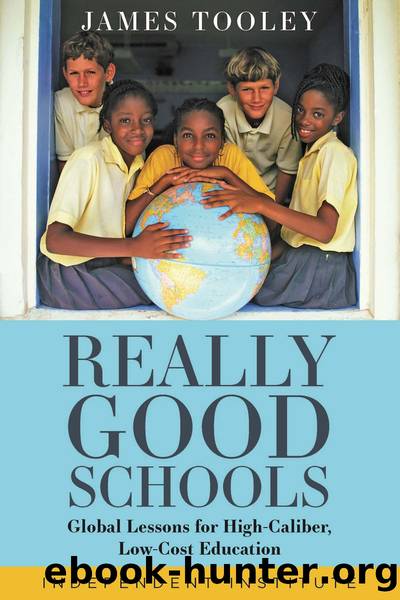Really Good Schools by James Tooley

Author:James Tooley
Language: eng
Format: epub
Publisher: Independent Institute
Published: 2021-09-15T00:00:00+00:00
The Knowledge
I am not alone in having thoughts, from time to time, about the end of the world, what form it might take, and whether one could survive it. Sometimes I find myself browsing YouTube using keywords like âend of the world,â âlast days,â and âapocalypse.â Judging by the amount of material out there, I know Iâm not the only one. For decades, there have been many films featuring post-apocalyptic worlds, from the 1950sâ The Day the Earth Stood Still and The War of the Worlds through to this centuryâs The Day after Tomorrow, The Road, and 10 Cloverfield Lane. Some of these are based on novels, and there are many more novels not made into films. There are numerous postapocalyptic video games, including the Fallout series, Darksiders, and Metro 2023.
Of course, it goes back much further than these recent works of fiction. Where does the word apocalypse come from? Itâs the original Greek name for the end-of-the-world story incorporated as the last book of the Christian Bible, translated into English as âRevelation.â5 The other âreligions of the bookâ have their own end-of-the-world stories too. In Islam, the Great Judgment and the Great Resurrection are described in the Quran, and the Great Tribulation in the Hadith. Judaism, of course, has its end-of-days transition from the old to the new era, when the Messiah will come.
Clearly, apocalypses strike a deep chord in the human psyche. Apocalypses connect with our deep angst about our place in the universe. They connect with fears about the harm we are doing to our planet, to each other, and to ourselves. They highlight terror about what lies outside of humanityâs control. But apocalypses also connect with hope, about what might be achieved afterward, once so much of what is wrong with humanity has been wiped clean. They can nurture our hopes as to how we would be able to rise above adversity to become a hero in the strange, new postapocalyptic world.
Young people find these apocalyptic scenarios especially stimulating, as evidenced by the market for films, novels, and computer games aimed at young people. One writer explained it as follows: postapocalyptic novels are âessentially heroesâ journeys ⦠set in an imagined future world.â When something catastrophic happens, âthe teenage protagonist is catapulted out of their normal existence into the unknown.â Their journey begins, along which they are tested, and as they survive these tests, they realize their destiny to change the world: âthe stakes are high. ⦠Itâs heady stuff, far removed from the routine of everyday life.â6
Young people are particularly interested in the hopes and fears excited by postapocalyptic scenarios. This idea set me thinking. Could the idea of apocalypse and postapocalyptic survival somehow be incorporated into the end point of the curriculum, framing childrenâs motivation to engage with it?
An end point must satisfy three criteria: First, it must provide motivation for children and young people to learn the content. Second, it must also go some way itself to provide a justification for the content to be learned.
Download
This site does not store any files on its server. We only index and link to content provided by other sites. Please contact the content providers to delete copyright contents if any and email us, we'll remove relevant links or contents immediately.
The ChatGPT Millionaire: Making Money Online has never been this EASY by Neil Dagger(771)
Dan Lok by unknow(691)
Side Hustles for Dummies by Simon Alan R.;(657)
Improving Internet Access to Help Small Business Compete in a Global Economy by Hermann E. Walker(570)
From Science to Business: Preparing Female Scientists and Engineers for Successful Transitions into Entrepreneurship: Summary of a Workshop by Catherine Jay Didion(541)
Start. Scale. Exit. Repeat. by Colin C. Campbell(527)
How to Grow Your Small Business by Donald Miller(524)
500 Ways to Make Money by NAVEEN CHAUHAN(489)
Do Bigger Things: A Practical Guide to Powerful Innovation in a Changing World by Wilde Jennifer & McClure Dan(488)
Tiny Business, Big Money by Elaine Pofeldt(473)
Founder vs Investor by Elizabeth Joy Zalman(463)
The Startup Owner's Manual by Steve Blank(441)
Studies on hydrolysisalcoholysisammonolysis mechanisms of ethylene terephthalate dimer using DFT method by unknow(430)
Think Your Way to Success: How to Develop a Winning Mindset and Achieve Amazing Results by Mark Rhodes(425)
The Worth of Water by Gary White & Matt Damon(407)
SURVIVAL SKILLS FOR FREELANCERS by Townsend Sarah(404)
The Harder I Fall, the Higher I Bounce: Life Lessons From the Entrepreneur Dubbed the King of Kiosks by Fortune Magazine by Max James(401)
Read Books All Day and Get Paid For It: The Business of Book Coaching by Jennie Nash(401)
The Five Most Important Questions You Will Ever Ask About Your Organization by Peter F. Drucker & NULL(397)
